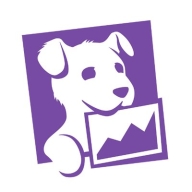

Datadog and Prisma Cloud by Palo Alto Networks compete in the cloud monitoring and security space. Datadog excels in observability and integration, while Prisma Cloud is particularly strong in cloud security management across various environments.
Features:Datadog offers shared dashboards, extensive integrations, and seamless automation. Prisma Cloud is known for its security management, insight into configurations, and compliance monitoring across cloud environments.
Room for Improvement:Datadog could improve dashboard sharing controls, real-time alert metrics, and security integration features. Prisma Cloud users want better integration of components, improved compliance reporting, and more governance features.
Ease of Deployment and Customer Service:Datadog is praised for its easy deployment and effective customer service, although navigating its features can be challenging. Prisma Cloud is flexible in hybrid cloud environments but needs improvement in support speed and effectiveness.
Pricing and ROI:Datadog's pricing is complex but justified by its flexibility and operational efficiency. Prisma Cloud's high cost is seen as valuable due to its robust features, though challenging for smaller companies. Both offer flexible sales and licensing approaches.
Previously we had thirteen contractors doing the monitoring for us, which is now reduced to only five.
Datadog has delivered more than its value through reduced downtime, faster recovery, and infrastructure optimization.
I believe features that would provide a lot of time savings, just enabling you to really narrow down and filter the type of frustration or user interaction that you're looking for.
It eliminates the need for additional hardware, making it a financially and technically sound investment.
Reputation and data security are the two most important things to a financial institution.
We may have prevented a security breach with remediation of the findings.
When I have additional questions, the ticket is updated with actual recommendations or suggestions pointing me in the correct direction.
Overall, the entire Datadog comprehensive experience of support, onboarding, getting everything in there, and having a good line of feedback has been exceptional.
I've had a couple instances where I reached out to Datadog's support team, and they have been really super helpful and very kind, even reaching back out after resolving my issues to check if everything's going well.
They can respond with technical documentation or pass on the case to the next level because it requires the development of a new feature or changing a feature due to a bug.
Anywhere we raise a tech case, they revert back within an hour.
I would rate them a nine out of ten because whenever there are issues, they are able to resolve them within the timelines and SLAs.
Datadog's scalability has been great as it has been able to grow with our needs.
We did, as a trial, engage the AWS integration, and immediately it found all of our AWS resources and presented them to us.
Datadog's scalability is strong; we've continued to significantly grow our software, and there are processes in place to ensure that as new servers, realms, and environments are introduced, we're able to include them all in Datadog without noticing any performance issues.
Scalability-wise, I rate the solution a nine out of ten.
We haven't had any issues scaling the solution.
There aren't any limits to Prisma Cloud's scalability.
Datadog is very stable, as there hasn't been any downtime or issues since I've been here, and it's always on time.
Datadog seems stable in my experience without any downtime or reliability issues.
Datadog seems to be more stable, and I really want to have a complete demo before making a call to decide on this.
I would rate it a ten out of ten for stability.
Most of the time, when the client requires data, it is not available.
The cloud environment is dynamic, so the tool must be dynamic.
It would be great to see stronger AI-driven anomaly detection and predictive analytics to help identify potential issues before they impact performance.
We want to be able to customize the cost part, and we would appreciate more granular access control.
The documentation is adequate, but team members coming into a project could benefit from more guided, interactive tutorials, ideally leveraging real-world data.
Prisma Cloud is an excellent tool.
We could have deployed the runtime monitoring with Prisma Cloud by Palo Alto Networks, but within our organization at our company, it was very difficult to find who would be the owner for the alerts.
Even though documentation was available, it took a while for a new person to understand what integration meant, what will be achieved after the integration, or how the integration needed to be done on the Azure or AWS side.
The setup cost for Datadog is more than $100.
Everybody wants the agent installed, but we only have so many dollars to spread across, so it's been difficult for me to prioritize who will benefit from Datadog at this time.
My experience with pricing, setup cost, and licensing is that it is really expensive.
The cost was not on the higher side.
If you are using a single tool like Prisma Cloud, with a single license, you can monitor all environments, such as Google Cloud, Azure, AWS, and Oracle Cloud.
It is an expensive tool.
Our architecture is written in several languages, and one area where Datadog particularly shines is in providing first-class support for a multitude of programming languages.
Having all that associated analytics helps me in troubleshooting by not having to bounce around to other tools, which saves me a lot of time.
Datadog was able to find the alerts and trigger to notify our team in a very prompt manner before it got worse, allowing us to promptly adjust and remediate the situation in time.
It provides a single pane of glass.
If I want to check how many of my S3s have encryption, I can write a Lambda function in Prisma Cloud and get that report.
Overall, the most valuable features for us in Prisma Cloud are those that provide visibility, ensure compliance with regulations, and help us align our on-premises servers and cloud environments with mandated security standards.
| Product | Market Share (%) |
|---|---|
| Prisma Cloud by Palo Alto Networks | 9.6% |
| Datadog | 1.9% |
| Other | 88.5% |

| Company Size | Count |
|---|---|
| Small Business | 80 |
| Midsize Enterprise | 46 |
| Large Enterprise | 99 |
| Company Size | Count |
|---|---|
| Small Business | 36 |
| Midsize Enterprise | 22 |
| Large Enterprise | 56 |
Datadog integrates extensive monitoring solutions with features like customizable dashboards and real-time alerting, supporting efficient system management. Its seamless integration capabilities with tools like AWS and Slack make it a critical part of cloud infrastructure monitoring.
Datadog offers centralized logging and monitoring, making troubleshooting fast and efficient. It facilitates performance tracking in cloud environments such as AWS and Azure, utilizing tools like EC2 and APM for service management. Custom metrics and alerts improve the ability to respond to issues swiftly, while real-time tools enhance system responsiveness. However, users express the need for improved query performance, a more intuitive UI, and increased integration capabilities. Concerns about the pricing model's complexity have led to calls for greater transparency and control, and additional advanced customization options are sought. Datadog's implementation requires attention to these aspects, with enhanced documentation and onboarding recommended to reduce the learning curve.
What are Datadog's Key Features?In industries like finance and technology, Datadog is implemented for its monitoring capabilities across cloud architectures. Its ability to aggregate logs and provide a unified view enhances reliability in environments demanding high performance. By leveraging real-time insights and integration with platforms like AWS and Azure, organizations in these sectors efficiently manage their cloud infrastructures, ensuring optimal performance and proactive issue resolution.
Prisma Cloud by Palo Alto Networks provides comprehensive cloud-native security solutions. It covers dynamic workload identity, automated forensics, and multi-cloud protection, ensuring robust security across diverse cloud platforms.
Prisma Cloud delivers advanced capabilities for managing cloud security across AWS, Azure, and GCP platforms. It offers dynamic workload identity creation, real-time monitoring, and seamless integration into CI/CD pipelines. With automation, centralized dashboards, and enhanced visibility, users effectively manage security misconfigurations and vulnerabilities. While optimizing cloud environments through runtime protection and compliance, Prisma Cloud faces challenges with its navigation, pricing, and limited automation capabilities. Users seek improvements in API security, role-based access controls, and documentation quality, emphasizing the need for enhanced customization and reporting features.
What are the important features of Prisma Cloud?
What benefits or ROI should users consider in reviews?
Industries like finance and telecom rely on Prisma Cloud for managing cloud security posture and container security. Teams utilize its capabilities across hybrid and multi-cloud settings to ensure compliance and robust threat protection. Features like misconfiguration detection and runtime monitoring are critical in promoting security objectives in these sectors.
We monitor all Cloud Security Posture Management (CSPM) reviews to prevent fraudulent reviews and keep review quality high. We do not post reviews by company employees or direct competitors. We validate each review for authenticity via cross-reference with LinkedIn, and personal follow-up with the reviewer when necessary.